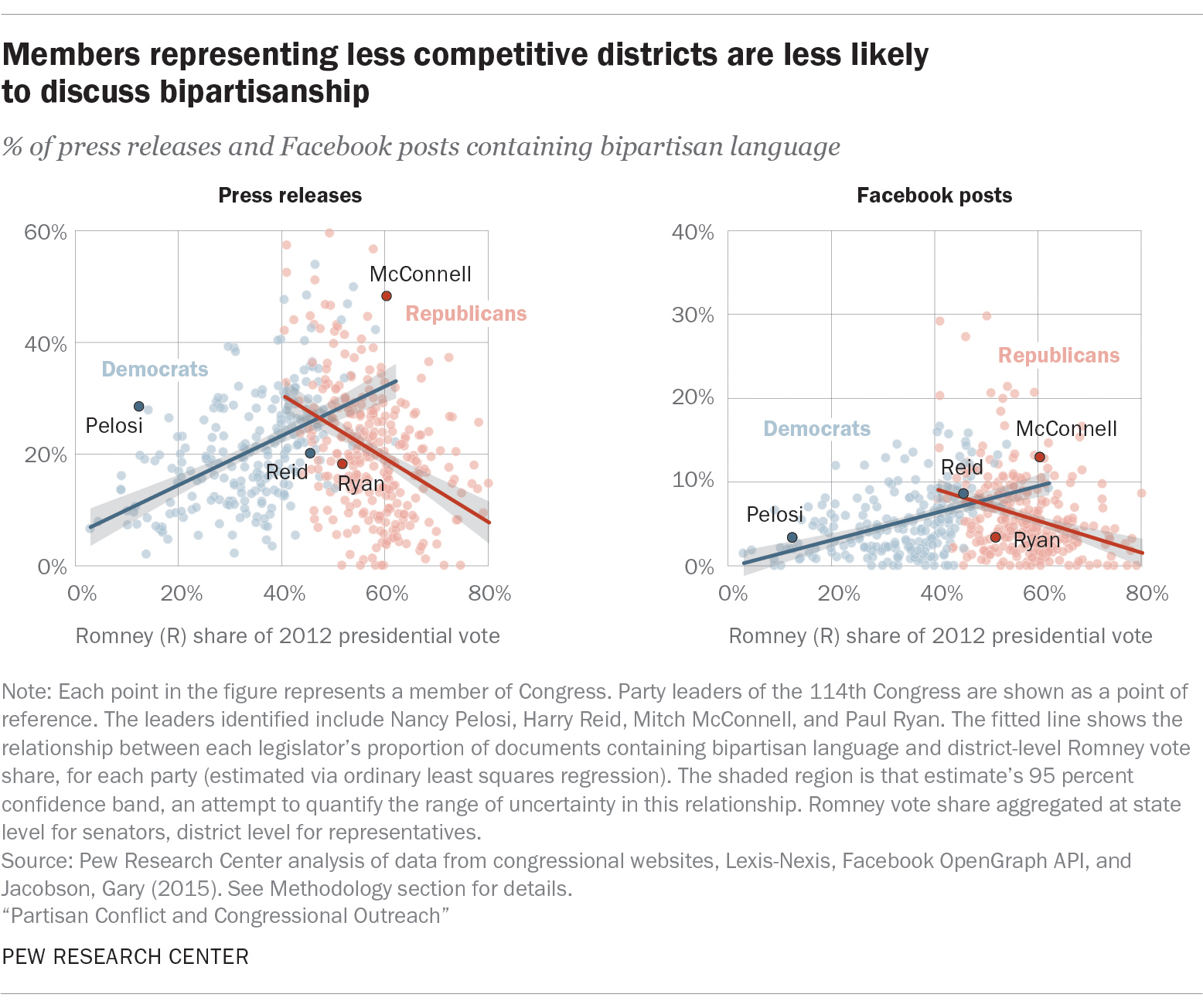While it is easy enough for observers and pundits to declare that modern American politics is “too negative,” it is much harder for social scientists to measure that phenomenon with precision. This report draws on new computational tools and statistical methods that allow researchers to look for patterns in large amounts of text. These tools provide a new way to examine one corner of the political world: the extent to which disagreement and strong language feature in the press releases and Facebook posts of members of Congress.
Not only does this analysis put a rough number on the amount of negativity in these channels of communication, it also reveals patterns in who goes negative and how often. To do so, it classifies every communication collected using a method that combines human judgements and machine learning.
To start, Pew Research Center collected 94,521 press releases from the websites of members of the 114th Congress and from LexisNexis for a 16-month period from Jan. 1, 2015, to April 30, 2016. The Center also collected 108,235 public posts on each representative’s official accounts on Facebook for the same time period (see the methodology section for details).
These two media are vital channels for lawmakers to reach their constituents. Members can use press releases and Facebook posts to reach thousands – sometimes even millions – of people at once. Some alternatives include postal mail, which takes days to arrive and must meet strict “franking” rules, town halls, or direct interactions with news media outlets. Meanwhile, creating social media posts or issuing press releases demands a limited set of internal resources available to all members. And there is evidence that newspapers frequently use these press releases as a source when covering local politics.7
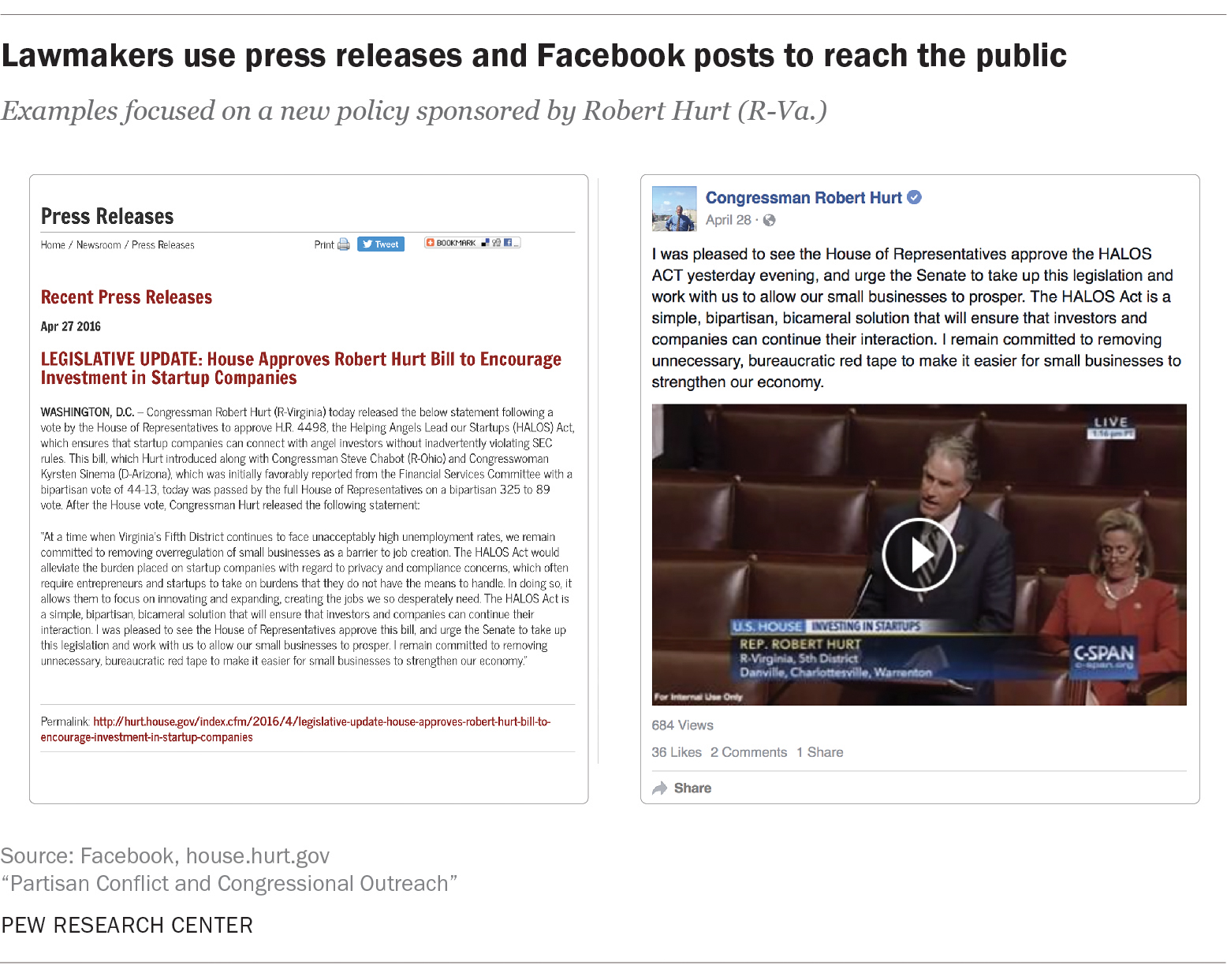
Unfortunately for lawmakers who have made press releases a core part of their communications strategy, there are fewer daily newspapers now than there were 10 years ago. However, politicians – and Americans generally – have been using social media more and more. Facebook, which Americans use more often than any other social media site, offers politicians an opportunity to reach a very large audience with very few limitations on what they can say. By using Facebook, a lawmaker’s staff can also keep track of how often users like a post, comment on it or share it with their friends. Thanks to this information, they can estimate how well or how widely a message was received in that network – and researchers can, too.
After the press releases and Facebook posts were collected, Pew Research Center analyzed the text using a combination of trained human readers and machine learning, with the goal of identifying the share of members’ communication that included opposition to the other side, the share that contained indignant remarks, and the share that expressed bipartisan sentiment. The Center developed criteria by which human content coders could judge whether a given communication included disagreement with the other side or opposition to its policies, whether the lawmaker who sent it was “going negative” and whether the message expressed bipartisan sentiment. Researchers used this sample to “train” machine-learning algorithms which were then applied to the remainder of the texts, yielding estimates of bipartisanship, opposition and negativity for every post and press release the Center obtained.
To better illustrate the differences between categories used in this report, the following section contains example documents for disagreement, indignant disagreement and bipartisanship. In each case, all five analysts who read the document agreed that each message contained “disagreement,” “indignant disagreement,” or “bipartisanship.” These documents have been chosen for illustrative purposes and do not represent a random sample.
Examples of congressional press releases and Facebook posts
Disagreement
“It may be the start of a new Congress, but we’re seeing the same old GOP giveaways to Wall Street. Today, Republicans held a vote on a bill, introduced late last night, that combines 11 bills into 1 big gift for special interests and big banks.” – Democratic Facebook post
“As Ways and Means Committee chairman, I’m proud to keep blocking President Obama’s tax increases on American energy, which would send Texas jobs overseas, and to help successfully lift the federal ban on exporting crude oil.” – Republican Facebook post
“This bill gives the Obama administration the tools it needs to use diplomacy to stop Iran from developing a nuclear weapon. Unlike last month’s unfortunate attempt by Senate Republicans to sabotage the diplomatic process, this bill provides a meaningful role for Congress without undermining diplomacy.” – Democratic press release
“Over six years have passed since the Keystone XL pipeline application was first submitted to the U.S. Department of State, and all the while, instead of approving its construction, President Obama has supported an energy agenda counterproductive to American success. Throughout the 112th and 113th Congresses, my fellow House Members and I have fought endless battles to overcome these administration-instituted delays.” – Republican press release
Indignant disagreement
“This is an outrage. House Republicans have already spent over 20 months and $4.5 million digging into Hillary Clinton’s emails and dragging her in to testify …. Now, they are not satisfied with the results of their last fishing expedition so they are shifting gears to investigate Hillary’s records directly because they’re concerned about ‘federal record-keeping.’ Give me a break …. As Majority Leader McCarthy openly admitted, this is a purely political effort to influence the U.S. presidential election. It should be funded by Republican campaign donors instead of the American people. It’s time to end this egregious waste of taxpayer resources and stop this unethical abuse of the powers of Congress.” – Democratic press release
“This is a blatant power grab by the Obama Administration …. The House of Representatives … has voted multiple times to overturn this shameless seizure of power …. The EPA claims this will be used to clean up “dirty waters”. Unfortunately, now the dirtiest thing about these waters is the fat, power hungry fingers of federal regulators dipping in to regulate it.” – Republican Facebook post
“Republicans have only been in control for a week and already they are picking an unnecessary political fight that risks shutting down the Department of Homeland Security and endangering our security… This is not a game and it is time for Republicans to take their responsibility to govern seriously, instead of playing to the most extreme voices in their party.” – Democratic press release
“My colleagues in both chambers of Congress rightfully feel the moral necessity of responding to such unaccountable overreach from this president. His actions were purely political and designed to drive a wedge between burgeoning minority communities and a center right country which prefers its government focus on economic issues and growing a stagnant economy. We must respond to the president’s assault on the democratic process by exercising our constitutional powers…” – Republican press release
Bipartisanship
“Don’t say bipartisanship is dead. Today, most Republicans joined almost every Democrat to force reauthorization of the Export-Import Bank through the House over the objection of Tea Party hardliners. I joined this bipartisan coalition because the Ex-Im Bank supports good paying jobs across the United States, and we must keep our economic recovery moving forward. I hope the Senate will follow our example and send reauthorization of the bank to the President as soon as possible.” – Democratic Facebook post
[t]
“Republicans and Democrats alike support eliminating the costs of unnecessary and obsolete regulations to help economic recovery.” – Republican Facebook post
“So much more unites us than divides us. When it comes to helping America get back to work, there is no partisanship. I will continue to work with both Republicans and Democrats to find ways to make life just a little bit easier.” – Republican Facebook post
Democrats criticized Republicans, who criticized Obama
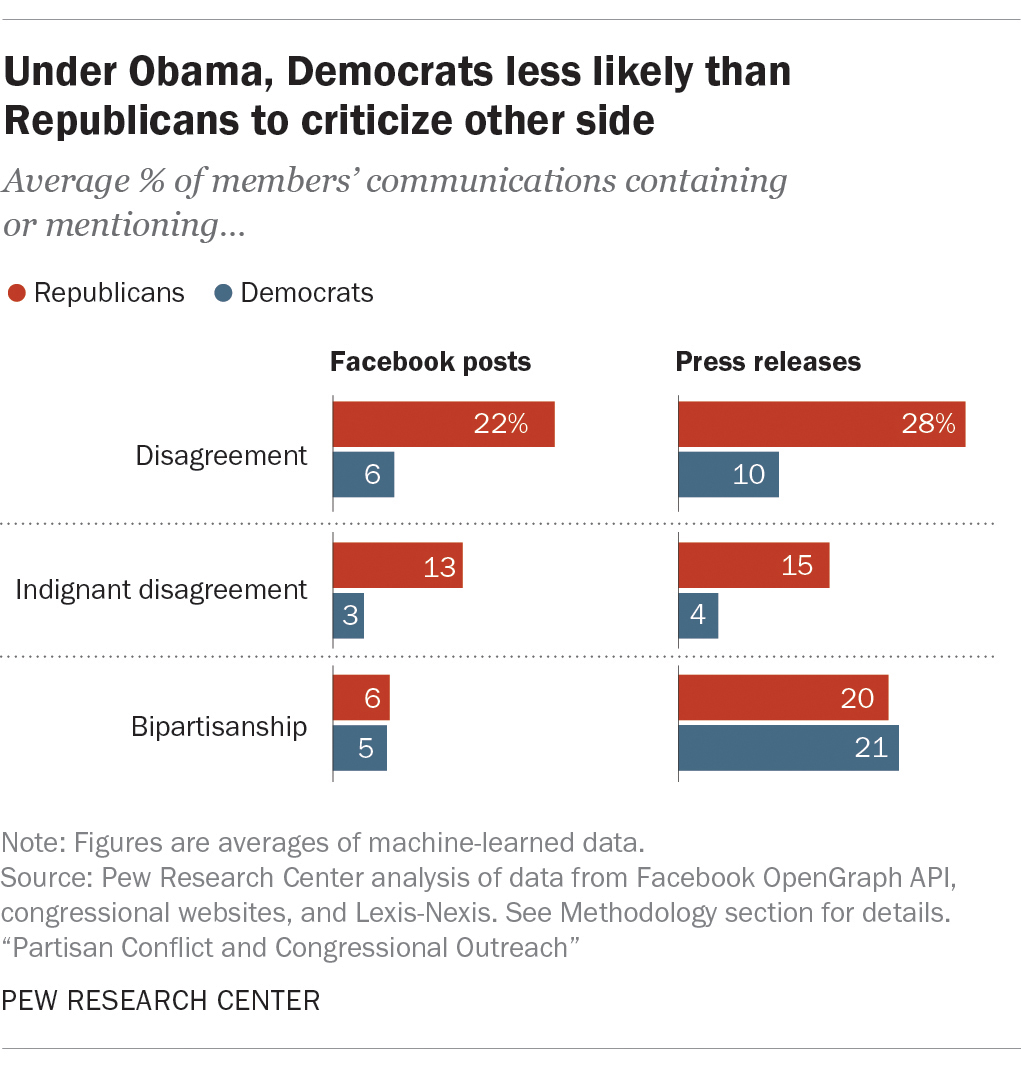
Overall, the kind of indignant disagreement that one might think of as “going negative” is relatively rare in official congressional communications. This study found that for an average member, roughly 10% of press releases and 9% of Facebook posts could be characterized as being strongly negative toward the other party or its leadership, a smaller share than were categorized as being bipartisan. On average, 21% of press releases and 15% of Facebook posts contained some form of disagreement.
But politics is situational, and different actors are called to negativity at different times. For members of Congress, political strategy differs greatly depending on which party controls the White House, the Senate and the House of Representatives. For the session of Congress under study – the 114th – the executive branch was controlled by the Democrats while Republicans controlled both the House and the Senate.
Reflecting GOP disagreement with President Obama, the analysis finds that in their public communications, Democrats and Republicans did not argue against the other’s policies and trade insults in equal measure. Instead, Democrats criticized Republicans, while for the most part the focus of Republican ire was President Obama.8 In this asymmetrical relationship – with congressional Republicans facing off against a Democratic president – Republican legislators came off as more likely to be negative in their press releases and social media posts.
In official press releases, the average Republican was almost three times as likely to disagree with Democrats or Obama than the average Democrat was to disagree with Republicans (28% for Republicans vs. 10% for Democrats). On average, Republicans also expressed indignant disagreement nearly four times more often than Democrats (15% vs. 4%).9 This pattern holds for Facebook posts as well.
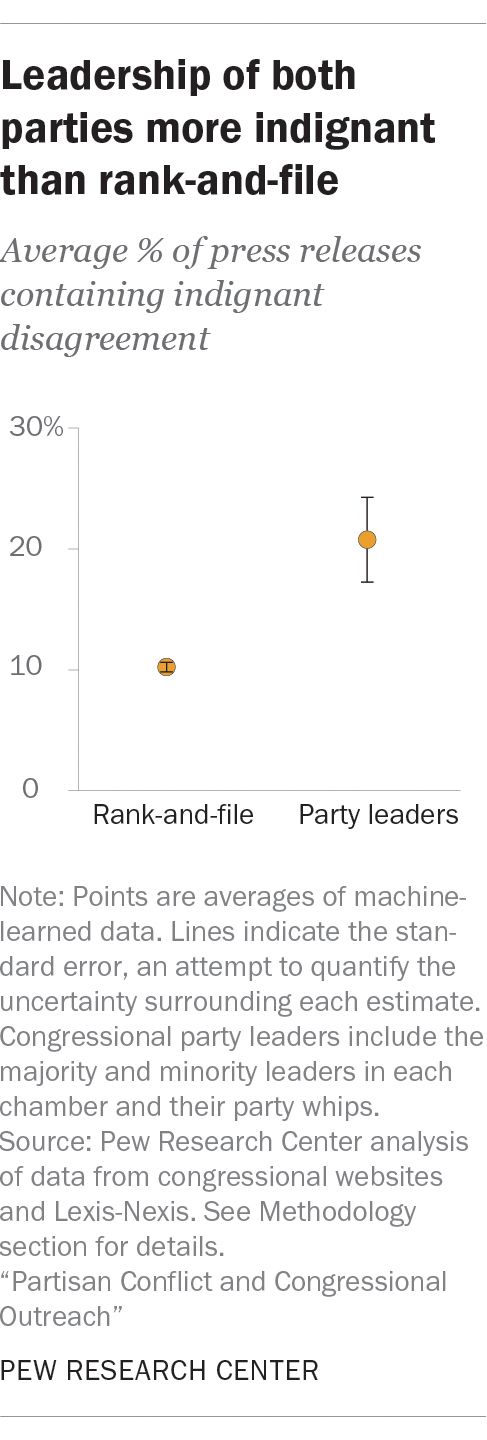
In the 114th Congress, when Democrats controlled the executive branch, Republican leaders expressed more negativity than their Democratic counterparts – a difference in line with overall between-party trends. On average, nearly one-in-four (24%) of Republican leaders’ posts expressed indignant opposition, compared with 15% for rank-and-file members. For Democrats, it was 17% for party leaders and 4% for the rank-and-file. It’s worth noting that Democratic Party whips expressed substantially lower levels of indignant opposition, on average: Just 3% of their press releases contained indignation, compared with 30% for Democratic minority leaders in the House and Senate.
Negativity more likely among most conservative and liberal legislators
There is a consistent relationship between the liberal or conservative leanings of a legislator and the extent to which they express political disagreement, both in press releases and Facebook posts. A given legislator’s ideological position is estimated using the DW-NOMINATE scale, which places lawmakers on a spectrum from roughly -1 (very liberal) to 1 (very conservative) based on similarities and differences in their legislative roll-call voting records.
[10.The most conservative or liberal lawmakers in each party are defined here as those with the top and bottom 10% of all DW–NOMINATE scores. Moderates are defined as the 10% of members in each party closest to the midpoint of the DW-NOMINATE scale.]
The pattern among Democrats is similar, with the most liberal Democrats expressing the highest rates of disagreement with Republicans. However, this trend is less pronounced, in part because of the relatively low rates of disagreement expressed by members of the Democratic Party. The most liberal Democrats disagreed with Republicans in 15% of press releases on average, compared with 5% among moderate Democrats. On Facebook, 10% of the most liberal members’ posts opposed Republicans on average, while the most moderate Democrats took such a stance in 2% of posts.
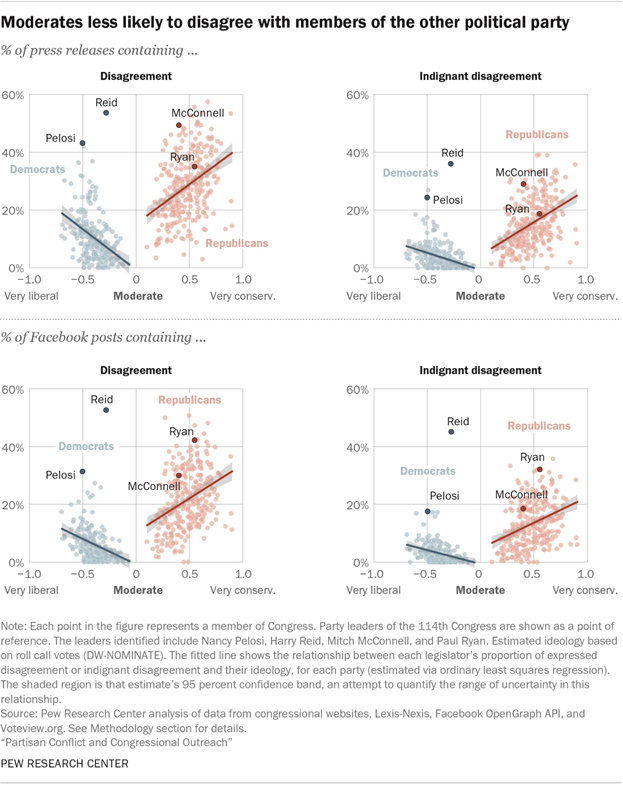
Moderates in both parties emphasized bipartisanship and constituent benefits
In contrast to very conservative and liberal members, ideological moderates – members who more often break ranks when it comes to voting on legislation – were more likely to advertise the fact that they were willing to cross the aisle. Among Republicans, moderates discussed bipartisanship in 28% of press releases, while moderate Democrats did so in 30%. But very liberal and conservative legislators only brought up bipartisan action in 14% and 12% of press releases, respectively.
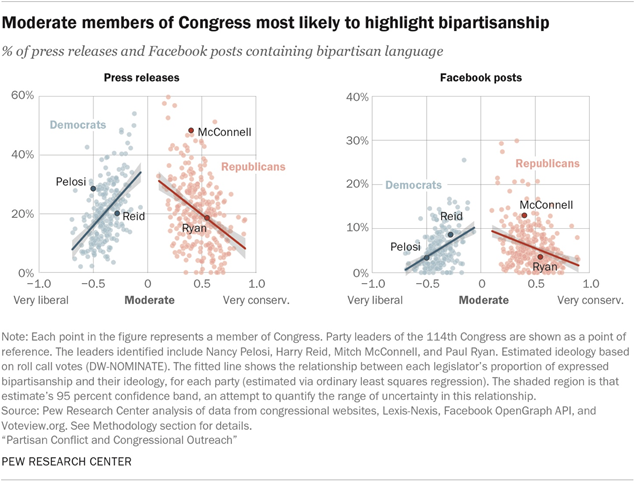
The Center separately measured how often members of Congress discussed constituent benefits in press releases, defined as favorable legislative outcomes and/or government spending that directly benefit an elected official’s home state or district. When members of Congress advertised their policy accomplishments to constituents, they often emphasized how their efforts were having – or would have – a direct impact on those back home in their districts. Such communications most frequently took the form of announcements of new government expenditures, programs that provide jobs, tax benefits, and funding for local programs. Past work has shown that such messages most often have a more powerful impact in terms of building support for representatives than other types of communications.10
On average, Republicans were less likely than Democrats to discuss how government policies and programs benefit their constituents: they did so in just 13% of press releases, compared with 23% for Democrats.11 This finding is notable in the context of lower support for earmarks and other forms of federal spending that have played an increasing role in Republican politics since the House and Senate adopted a ban on earmarks in 2011, after a concerted push from newly elected tea party-affiliated legislators who campaigned on the issue.12
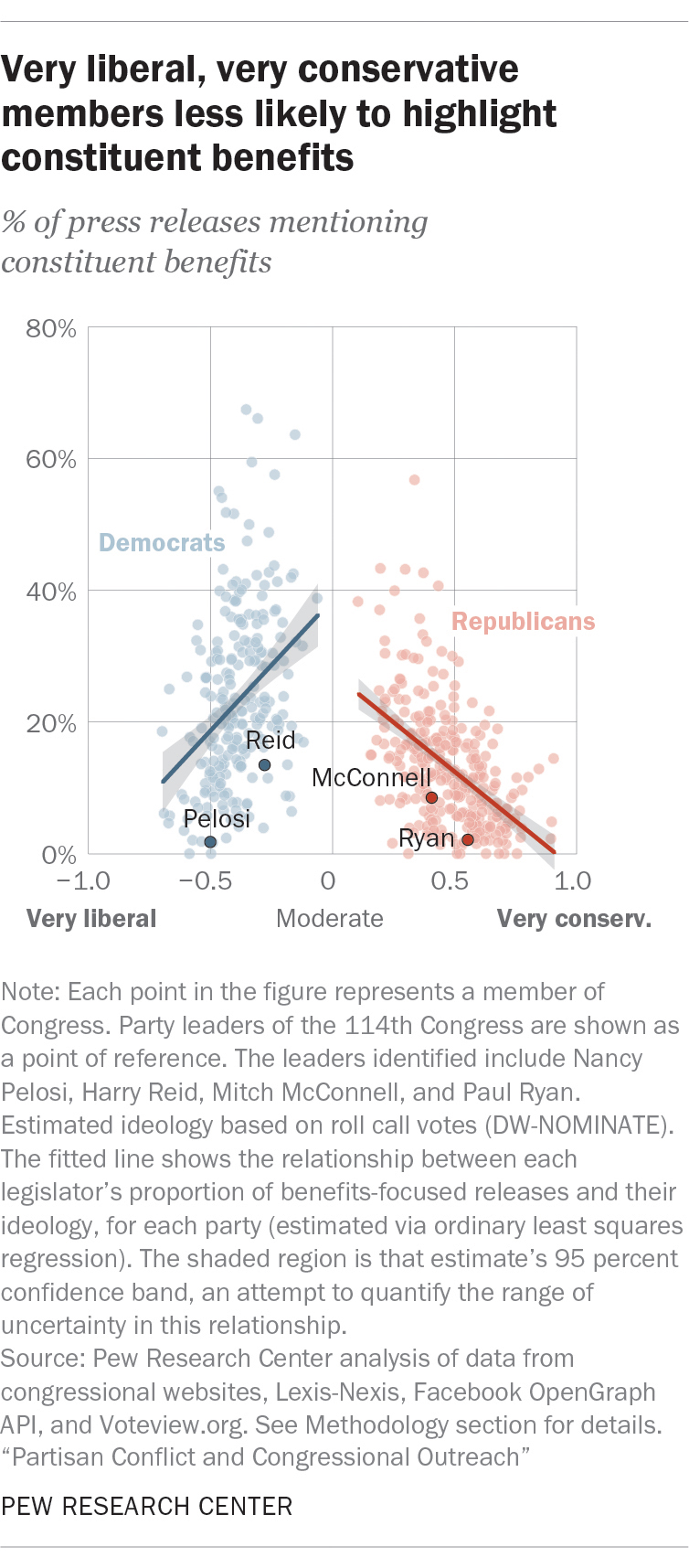
Overall, ideological moderates in both parties were more than twice as likely to announce
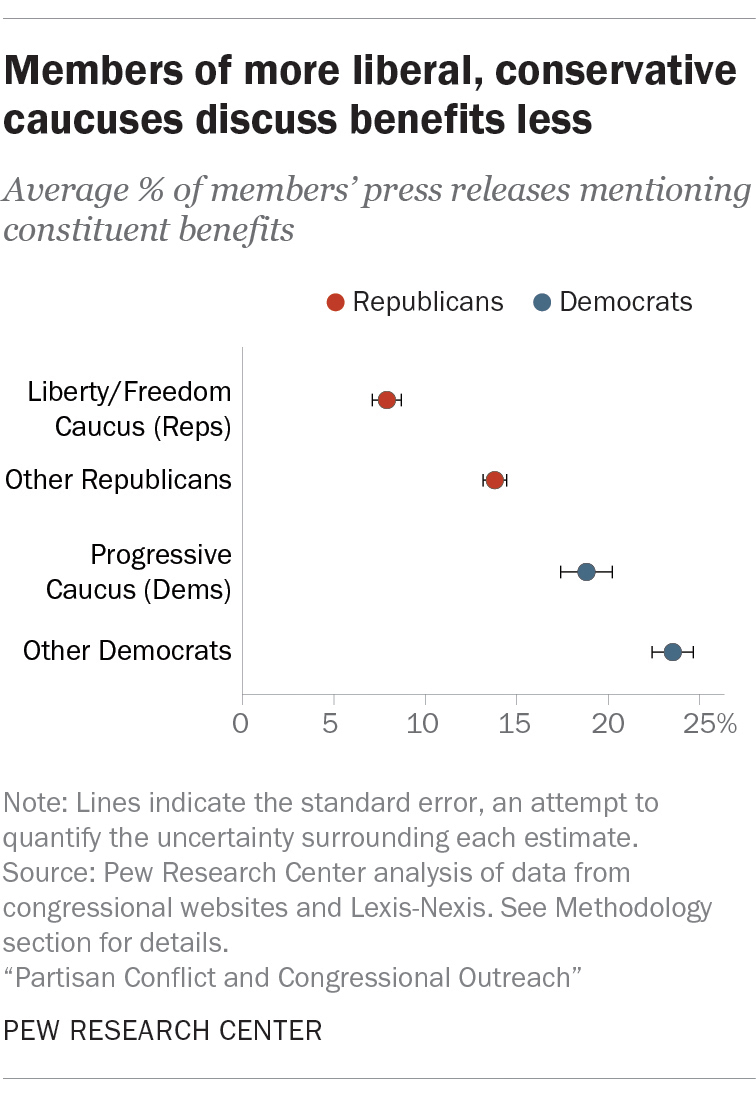
constituent benefits in their press releases, compared to very liberal and very conservative members (23% for moderates vs. 9%). But this difference is most pronounced among Democrats: about one-in-four (26%) of the most moderate Democrats’ press releases focused on benefits, compared with just 13% for the most liberal legislators, as measured by DW-NOMINATE. Furthermore, the share of members’ press releases mentioning constituent benefits has a strong, negative correlation with indignant disagreement.13 These differences also stand out when considering members of specific caucuses, like the conservative House Freedom Caucus and the liberal Progressive Caucus. Republicans in the Liberty Caucus and the Freedom Caucus, who tend to oppose expanding the role of government, were least likely to highlight constituent benefits, raising the topic in less than 8% of press releases, on average.
Legislators in less competitive districts more likely to attack the other party
Elected officials who represent more competitive districts and states – where the vote for president in 2012 was closer – tended to avoid criticism in their press releases and posts. But Republicans representing the least competitive districts – where Obama did the worst in his run for re-election – issued a substantially higher proportion of press releases containing disagreement (32%) than did Republicans in the most competitive districts (20%).14 On average, Republicans in the least competitive districts also issued about twice as many indignant releases (19% vs. 9%). A similar version of this pattern holds for Democrats. Democrats representing the least competitive districts – where GOP presidential candidate Mitt Romney did worst – issued about three times as many press releases containing disagreement (14% vs. 5%) and indignation (6% vs. 2%) than Democrats in the most competitive districts.
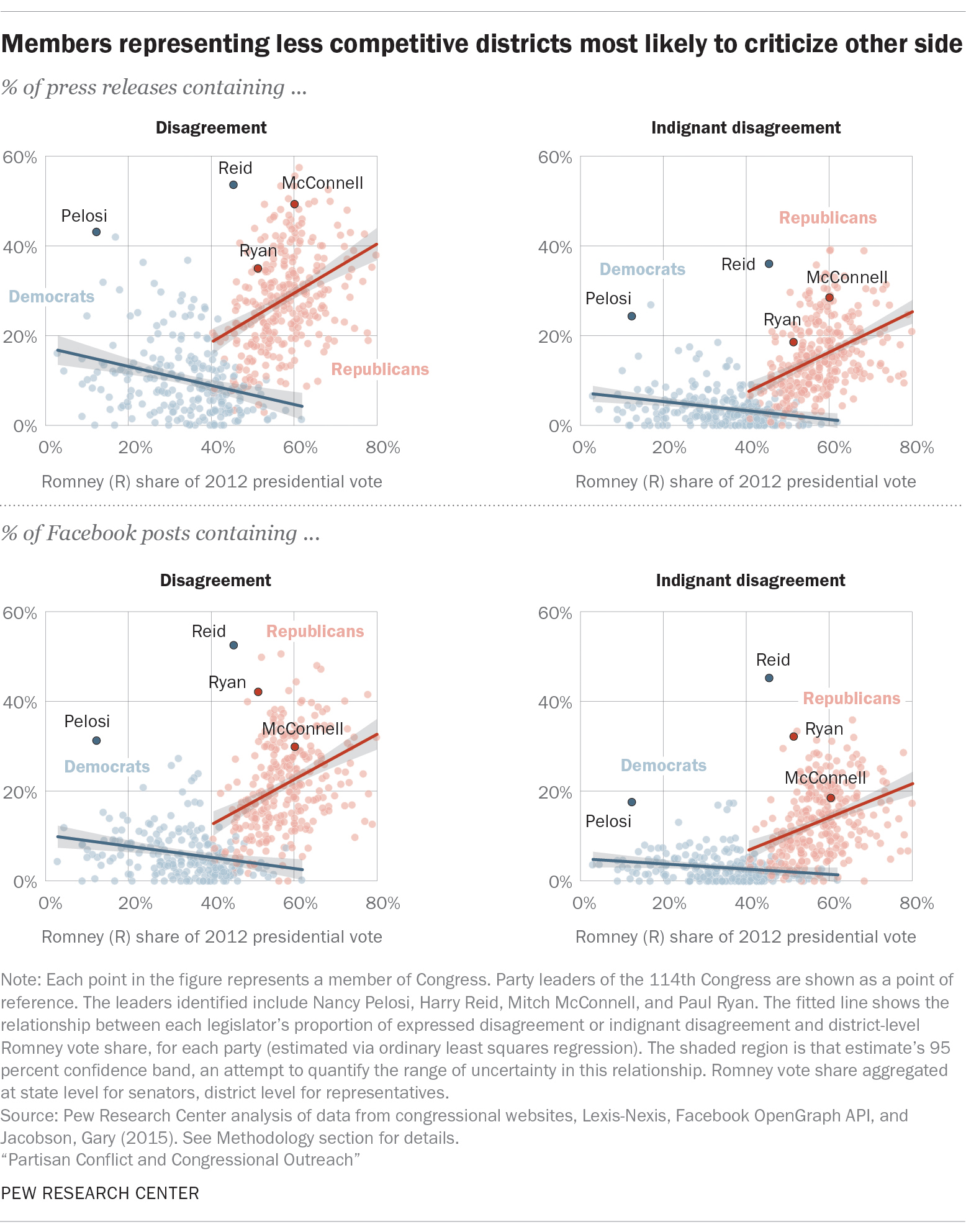
Members from competitive districts more likely to discuss bipartisanship
Members representing the most competitive districts were more likely to promote bipartisanship in their outreach efforts. On average, Republicans representing the most strongly Republican states and districts issued bipartisan messages in just 16% of press releases, compared with 29% among Republicans in the most competitive districts. By the same token, 12% of the press releases issued by Democrats in the least competitive districts contained bipartisan language. Those in competitive districts, by contrast, discussed bipartisanship in 30% of press releases, on average. These findings are consistent with existing research suggesting that “going bipartisan” is a strategy meant to increase support among moderates or swing voters.15
